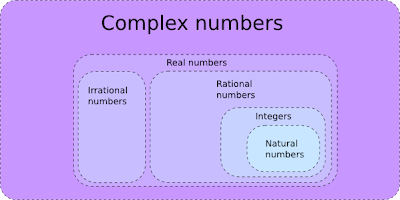The absolute value of an integer is the numerical value of the integer regardless of its sign .the absolute value of any integer say , a is denoted by |a|.On the number line the absolute value of an integer is regarded as the distance from a point irrespective of its sign. The absolute value of a integer is always positive .
Some Absolute value examples are |-5| = 15 , |13|= 13.
 |
| Complex number |
To understand absolute value inequality , we will take few examples.
Example1 : |3x| ≤ 6
To solve absolute inequality , here we will use the absolute inequality results
|x|≤ a => -a ≤ x ≤ a
=> |3x|≤ 6
=> -6 ≤ 3x ≤ 6
=> Divide both sides by 3, we have
=> -2 ≤ x ≤ 2
If a , b are two real number , then a number a+ ib is called as complex number.
Real and imaginary part of complex number : if z = a+ib is a complex number , then a is called the real part of z and b is known as the imaginary part of z . The real part of z is denoted by Re(z) and imaginary part is denoted by Im(Z).
 |
| Complex Number |
The plane in which we represent a complex number geometrically is known as complex plane or argand plane or the Gaussian plane The point Z plotted on the argand plane is called the argand diagram.The length of the line segmemt 0z is called the absolute of complex number z and is denoted by |z|.thus |z|=√x²+y ²
= √(Re(z))²+(Im(z))² In the above given figure z = 3+ 3i , so absolute of z , |z| = √3²+3 ²
=√18 = 3√2
Absolute value equations and inequalities
Now let us solve absolute value equations
Example1: Solve absolute value equation|x+ 5|= 4
Solution : For solving absolute value equations we will consider two cases
=> x + 5 = 4 or x + 5 = -4
=> x= -1 or x =-9 ans
Example 2: Solve the absolute inequality |x-2| ≥ 5
Solution : For solving absolute inequality , we will use the result
|x-a|≥ r => x ≤ a-r or x ≥ a+r
=> |x-2| ≥ 5 => x ≤ 2-5 or x ≥ 2+5
=> X ≤ 3 or x ≥ 7
=> X ∈ ( -∞ , -3] or x ∈ [ 7 ,∞)
The solution set of absolute inequality is ( -∞ , -3] ∪ [ 7 ,∞)